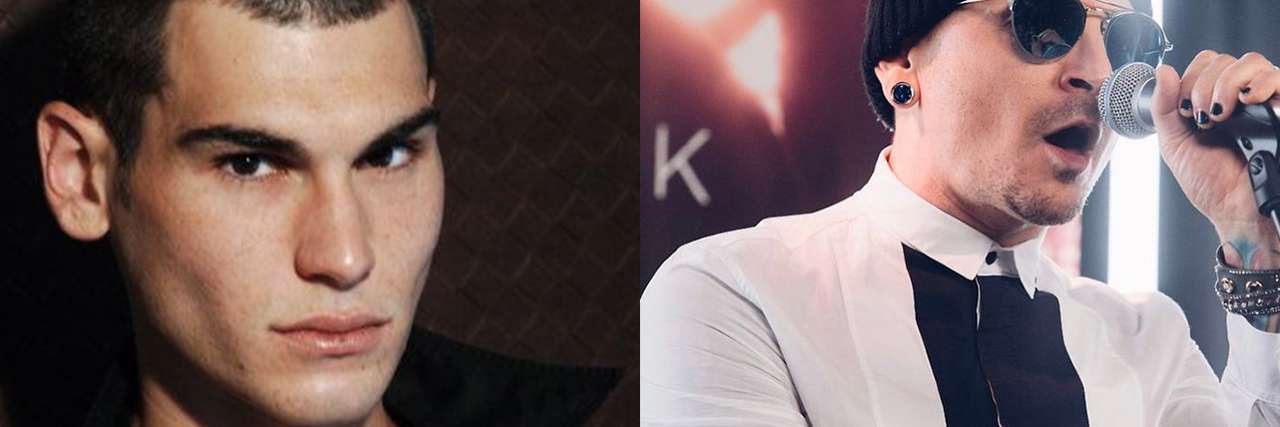Sometimes the news isn’t as straightforward as it’s made to seem. Sarah Schuster, The Mighty’s mental health editor, explains what to keep in mind if you see this topic or similar stories in your newsfeed. This is The Mighty Takeaway.
Editor’s note: This piece mentions suicide means. If you experience suicidal thoughts or have lost someone to suicide, the following post could be potentially triggering. You can contact the Crisis Text Line by texting “START” to 741-741.
TMZ has done it again. After another publicized and heartbreaking celebrity suicide, the celebrity gossip news outlet shared audio from the 911 call reporting the incident, an often traumatic experience shared by both suicide loss survivors and those who’ve witnessed a suicide.
This time, TMZ published the audio from the 911 call after “Veronica Mars” actor Brad Bufanda died by suicide earlier this month. TMZ had also published the 911 call made after Linkin Park singer Chester Bennington, who died by suicide in July, was found by his driver and housekeeper, in addition to the call made after Chris Cornell’s suicide.
The most recent audio, released after Bufanda’s suicide, actually includes a description of how it sounded during his final moments. A new low, even for TMZ.
I don’t know if reporting on 911 suicide calls is a new trend for celebrity news, but it needs to stop. Digging into the details after someone’s suicide isn’t the same thing as ripping on someone for wearing an “unfashionable” dress or reporting on who’s dating who. While there is, of course, an entire argument to be made about how intrusive and voyeuristic celebrity news is in general, suicide should never be treated like entertainment, and TMZ and other publications, need to report on it with respect. Treating suicide like it’s gossip is hurtful not just for people who’ve lost a loved one, but for those who’ve experienced suicidal thoughts themselves.
Contrary to what some people seem to think, celebrities are real people with real feelings and real families. While being a public figure does reduce your privacy, it doesn’t mean the world deserves to know unnecessary details about your death.
When it comes to suicide, details like how a person died and where they died can have negative consequences. Reporting on suicide guidelines specifically advise against sharing such details, stating, “Risk of additional suicides increases when the story explicitly describes the suicide method, uses dramatic/ graphic headlines or images, and repeated/extensive coverage sensationalizes or glamorizes a death.”
Not only did TMZ include the means in its original headlines when reporting on Bufanda’s death, its follow up article included details from the scene. This information, including audio from the 911 call, can be damaging to someone contemplating suicide. Additionally, no resources are provided for those who might be affected by the news.
Then, of course, there’s the fact that his family, and other suicide loss survivors, for that matter, might see this reporting. I can’t even imagine what it’s like to lose your loved one, then have those intimate details — like the 911 call made on their behalf — shared to the public. And the consequences of this kind of reporting are real. In a letter to the media, Deborah Greene, who lost her father to suicide, said:
You see for people like me, survivors of suicide loss, the notion of how our loved ones died is hard enough to live with. We may struggle with flashbacks, nightmares and post-traumatic stress disorder. Some of us found our loved ones, some have recreated images in our own minds based upon the details we came to know. But for all of us, it is a pain that is indescribable and one we must live with for the rest of our days…
So, when you choose to ignore the recommendations for responsive reporting on suicide loss, and I am confronted with a barrage of headlines on the radio, social media, in the paper or on the television, you also do harm to me. Because those headlines serve as a trigger, one that rips open the very fragile scab that has formed over my loss and exposes every ounce of my pain. The images I’ve worked to place on the back burner of my days come roaring in with a vengeance, the tears begin to flow and I feel assaulted by your salacious details. And long after I turn you off your words linger.
Suicide is usually spoken about in whispers, so when a celebrity takes their own life, we have a chance to talk about it a little bit louder. While we can’t bring them back, we can at least, in the respect of their memory, share useful and potentially life-saving information in their honor. When we focus on the means in which they died and turn 911 calls into entertainment, we’re telling the world people who die by suicide don’t matter. And that couldn’t be further from the truth.
TMZ didn’t respond to The Mighty’s request for comment.
If you or someone you know needs help, visit our suicide prevention resources page.
If you need support right now, call the National Suicide Prevention Lifeline at 1-800-273-8255, the Trevor Project at 1-866-488-7386 or reach the Crisis Text Line by texting “START” to 741-741.
Lead photo via TMZ

